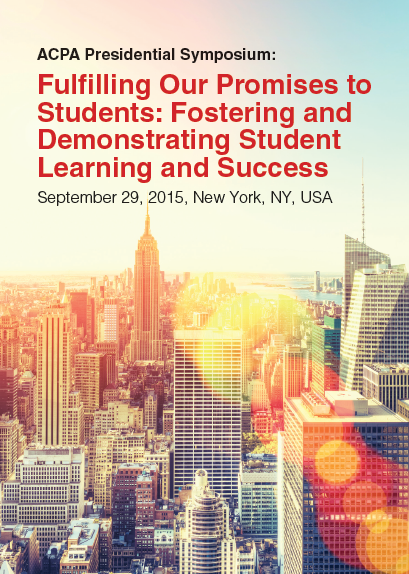From the President's Desk
 The benefit of June, July, and August on many college campuses is that the pace slows down allowing time for reflection and planning for the coming academic year. I’ve spent those months continuing to consider our role as college student educators in fostering student learning and success.
The benefit of June, July, and August on many college campuses is that the pace slows down allowing time for reflection and planning for the coming academic year. I’ve spent those months continuing to consider our role as college student educators in fostering student learning and success.
Currently, a great deal of focus is on student learning in higher education. President Obama’s completion agenda centers on post-secondary certificate or degree completion. The Association of American Colleges and Universities’ (AACU) (n.d.) Essential Learning Outcomes and the Lumina Foundation’s (2015) Degree Qualification Profile (DQP) identify the knowledge and skills U.S. college graduates should have. There are increasing calls for accountability from a variety of constituencies inside and outside higher education. As part of this call for accountability, the federal government is requesting demonstration of learning outcomes. In addition, legislatures, parents, and students are seeking validation of the return on their financial investment in higher education. And, employers are lamenting that college graduates don’t possess critical knowledge and skills to effectively perform in the workforce. There is a great deal at stake for higher education if we can’t foster learning and then demonstrate what students acquire from their college experience. While accountability is one reason higher education needs to focus on student learning, it shouldn’t be the only reason. Our job is students’ education and we should be able to demonstrate our role in it.
While the current focus on accountability in higher education is centered on student learning across the entire collegiate experience, college student educators should be able to articulate the unique impact we have on student learning. To be an equal partner on campus and compete for valuable resources we need to be able to effectively articulate our contributions to student success. In a resource deficient collegiate environment decisions regarding financial allocations are based (or at least should be) on evidence of contribution to the educational mission of the institution. We need to focus on fostering and documenting student learning and success to demonstrate the connection to that mission. ACPA-College Student Educators International is providing an opportunity this fall to assist in achieving this goal.
ACPA will sponsor the 2015 Presidential Symposium: Fulfilling Our Promise to Students: Fostering and Demonstrating Student Learning and Success on September 29th from 1pm-5pm ET/12pm-4pm CT/11am-3pm MT/10am-2pm PT. This is an innovative, action-oriented, engaging educational opportunity with a live event hosted at the Fashion Institute of Technology in New York City and “campus participation parties” across North America. Our goal is to create a learning community of more than 5,000 people for the world’s largest online professional development event.
An activity focusing on student learning wouldn’t be a quality one if it didn’t have its own learning outcomes. As a result of attending this event, participants will be able to:
- Describe benefits of increasing accountability for student learning and development,
- Identify current state of affairs regarding accountability for student learning and development, and
- Articulate guidelines, strategies, and methods for improving accountability for student learning and development
The symposium will be composed of three content modules guided by the following questions:
- Why is it important for colleges and universities to focus on student learning and development?
- In what ways do student affairs educators foster student learning and development?
- How can student affairs educators effectively demonstrate our impact?
Each module will be comprised of two 12-15 minute high intensity talks. After each module will be an opportunity for a “campus conversation” allowing individuals at participating campuses to discuss and apply the information to their own context. Individual workbooks and facilitator guides will be distributed for reflection and discussion. Individuals who are not part of a campus site will be able to participate at a regional campus site or join hosted virtual conversations with other colleagues. The “campus conversation” after the final module will be dedicated to campus-based action planning identifying ways to improve fostering and demonstrating student learning.
All talks will be recorded enabling registered participants to use them for future professional development or in graduate courses. In addition, all materials for the symposium (recordings, manuals, supplemental resources) will be packaged to create a “professional development in a box” that can be used if an individual, department, or division isn’t able to participate synchronously on September 29th.
Hopefully, you are as excited as we are about this innovative opportunity and want to know how to sign up as an individual, department, division, or graduate preparation program. ACPA wants to make this high-quality educational event cost effective. The cost is a mere $19 per individual or $99 per site (for as many people who can fit into a room to view the streaming). With many webinars running as high as $400 for 60 minutes, this symposium is sure to be one of the most economical educational events of the academic year.
To register simply visit http://www.myacpa.org/events/2015-presidential-symposium-fulfilling-our-promises-students-fostering-and-demonstrating. I hope you will join 5,000 of your colleagues and participate in the 2015 ACPA Presidential Symposium.
References
Association of American Colleges and Universities. (n.d.). Essential learning outcomes. Retrieved from https://www.aacu.org/leap/essential-learning-outcomes
Lumina Foundation. (2015). Degree qualifications profile. Retrieved from http://degreeprofile.org
